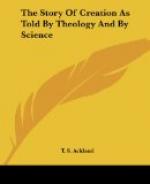Latterly, however, the theory has found a far more able advocate in the person of Mr. Darwin, with whose name it has been popularly identified. By his indefatigable labours a vast variety of facts have been collected and skilfully arranged, to show that all the varieties of life may be satisfactorily accounted for by the continued action, through a long course of ages, of certain natural causes, with the results of which we are familiar, and of which intentional use is continually made by man. Mr. Darwin does not deny the existence of a Creator, but the tendency of his arguments is to prove that His interference was limited to the single act of original Creation; and that from the moment of its creation the world has been a sort of automatic machine, producing its results without any interference from any higher power.
The theory taken as a whole comes into contact with the Mosaic Record in three points:—
1. As it assumes the possibility that life may be self-originated.
2. As it indicates a mode of procedure different from that given by Moses.
3. As it requires unlimited time.
Of these the last is already disposed of, when the narrative is shown to be capable of an interpretation in accordance with it. The first requires only a brief notice; but the second must be carefully investigated, to separate ascertained truth from inferences which have no sufficient foundation.
The theory of spontaneous generation rests almost entirely upon assumptions. Its only semblance of support from facts is derived from certain experiments of a very unsatisfactory character, which are said to have resulted in the production of some of the lowest forms of animal life. These experiments have been by no means uniformly successful. One or two experimenters have thought that they have succeeded, but not uniformly, while the same process, repeated by men whose scientific and manipulative powers are universally recognized, has never once resulted in any seeming development of life. Even if, however, they had been uniformly successful, there would have been great reason to doubt whether the apparent success was not really a failure—a failure in the precautions necessary to exclude all germs of life from the matter experimented upon. For the lower forms of life are excessively minute; and their germs—eggs, seeds, or spores—must be far smaller. It is known that these are constantly floating in the atmosphere, though, owing to their extreme minuteness, the fact can only be ascertained by the most skilful investigation. And the lower forms of animalcules have a singular tenacity of life; they can pass unharmed through processes which would be fatal to creatures of higher organization. One variety is known to survive entire desiccation; another lives upon strychnine; others bear without injury great extremes of heat and cold; and if this is the case with the mature creatures, it is probable that the germ possesses




